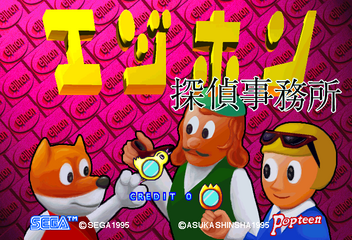Ejihon Tantei Jimusho
From Sega Retro
| Ejihon Tantei Jimusho | |||||||||
|---|---|---|---|---|---|---|---|---|---|
| System(s): Sega Titan Video | |||||||||
| Publisher: Sega Enterprises, Ltd. | |||||||||
| Developer: Sega AM1[1][2] | |||||||||
| Licensor: Asuka Shinsha | |||||||||
| Genre: Puzzle | |||||||||
| Number of players: 1-2 (simultaneous) | |||||||||
|
This teeny-tiny article needs some work. You can help us by expanding it.
Ejihon Tantei Jimusho (エジホン探偵事務所) is a 1995 arcade game developed by Sega AM1 for the Sega Titan Video in which you use a magnifying glass to find clues to solve a mystery. It is based on a comic strip published by Asuka Shinsha in Popteen magazine[3], which was released as a book shortly before the game came out[1].
Contents
Gameplay
At the start of the game, the player is given a choice between beginner or expert difficulty. Both options see the player traversing a map filled with mystery minigames, with the goal of reaching a certain person, but for the former, the player is tasked with reaching the detective (探偵)'s room, while in the latter, they are tasked with catching Phantom Dopon (怪盗ドポン). The game can be played alone or as a competition between 2 players, with player 1 controlling Temona-kun (テモナくん) and player 2 controlling Meruko-chan (メル子ちゃん), both of whom are apprentice detectives.
During mysteries, the player is given a phrase, written in kanji, where two of the characters in it look very similar, and will generally also have similar meanings. The given illustration, which is based on this phrase, will be covered in one of these characters, but among these countless little characters, one of these is actually the other character. The player has to move the cursor (represented by a magnifying glass) across the illustration and select the odd one out. The player will receive hints at regular intervals, but has to solve the mystery within a time limit, otherwise they will lose and be given a new phrase and illustration. A heart gauge on the side of the screen constantly drops throughout the game and the game is over when it is fully depleted, and the way to replenish it is by solving mysteries. The game has 52 mysteries which are chosen mostly at random, and it is impossible to encounter every mystery in a single playthrough[1].
Every few stages is a unique stage, thematically different between difficulty selections. On beginner mode, the detective sets the terms of battle, or in other words, chooses the type of minigame, and will reward a heart to the winner. In expert mode, Phantom Dopon is trying to escape from the protagonists in some way, so they are trying to catch or find Phantom Dopon.
The game infamously has a shocking game over screen which shows Temona-kun and Meruko-chan traumatized after having their detective statuses revoked[1].
Graphics and art
The illustrations used in throughout the mysteries resemble the illustrations from the original comic. The attract mode and cutscenes meanwhile use an oil painting art style. Game designer Shinichiro Okumoto, when asked about these new visuals, stated they went with oil painting "because it's funny for some reason"[1].
Music and sound
About a third of the game's music is reused from Puzzle & Action: Tant-R and Puzzle & Action: Ichidant-R. 2 songs are reused from Twin Squash.
History
Legacy
Ejihon Tantei Jimusho was ported to the Sega Saturn through the magazine CD Game-Ware. This version added 4-player support and a bonus Karaoke Mode. Sega Logistics Service announced it would end service on the arcade machines on March 31, 2017.[4][5]
Magazine articles
- Main article: Ejihon Tantei Jimusho/Magazine articles.
Production credits
- Producer: Rikiya Nakagawa[3]
- Director: Shinichiro Okumoto[6]
- Direction, SE: Kazuhiko Nagai[7]
Physical scans
References
- ↑ 1.0 1.1 1.2 1.3 1.4 Saturn Fan, "1995 July" (JP; 1995-06-08), page 64
- ↑ 2.0 2.1 Sega Arcade History, Enterbrain, page 137
- ↑ 3.0 3.1 Saturn Fan, "1995 June" (JP; 1995-05-08), page 51
- ↑ File:SegaProductsTerminationAnnouncement 2016-11 JP.pdf
- ↑ File:SegaProductsTerminationAnnouncement 2016-12.pdf
- ↑ https://sega.jp/fb/segavoice/050127/01.html (Wayback Machine: 2022-10-28 01:02)
- ↑ https://sbtransr02.wixsite.com/kazuhiko-nagai/my-works-1 (Wayback Machine: 2021-04-10 08:56)
| Ejihon Tantei Jimusho | |
|---|---|
|
| |

